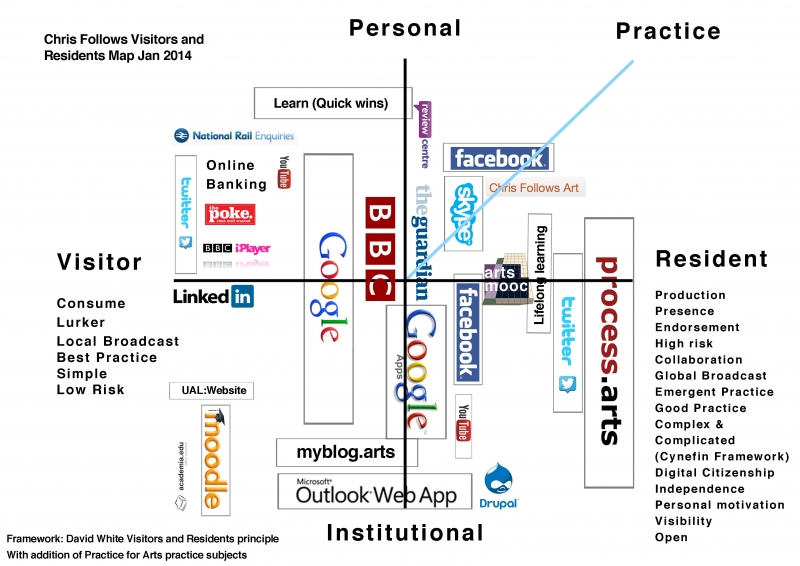Visitors and Residents Mapping
There are plenty of ways to get online some easy and some not so easy, making an informed choice based on your long term needs could make a huge difference to how your online environment, life, presence and practice evolves over time.
There are a number of personal/professional reasons for being online and our choice of online environment/s can be an important long term decision, from:
- Social media
- The readymade one click, out the box solution, 'tied in' proprietary packages
- DIY hands and demanding webmaking, code & open source route.
Being a resident online requires some experience and commitment in online engagement, there are many vital things to consider before starting this journey, this project aims to explore these challenges, please see some links below to get started, useful links & resources:
- Online Collaborative Practice and WebMaking
- Commercial or open source
- Have we the right balance between open education and commercial social media?
- Talking about online and offline Communities of Practice for the Creative Online Identities course
- Copyright issues
- Open Education
Whichever we choose understanding the benefits, negatives and challenges and getting to grips with creating your own online environment can be difficult and can an ongoing, long term iterative process.
Understanding your online environment - Visitors and Residents mapping
A good example of understating your place online is well illustrated in David White’s the ‘Visitors and Residents’ mapping process also see What exactly are your students up to online?. As we move along the visitor and residence continuum we make best use of commercial and institutional/VLE software that is offered to us e.g easy to use or must be used as part of job/VLE or life/online banking.
Videos
A series of videos produced by David White of Oxford University explaining the Visitors and Residents model.
Find out more about Netskills' work on Visitors & Residents
Workshop: Are you an online Visitor or Resident?
A practical workshop using the Visitor or Resident model to help participants explore and enhance their online practice. The workshop is supported by a series of online follow-up sessions to support participants in carrying out real- world, experiential activities in new forms of practice.
Some V&R map examples:
| BYOE Visitor and Residence map | Visitor and Residence map |
 |
 |
Try your own map out ?
| V & R Blank map | V & R Map with additional practice |
 |
 |



